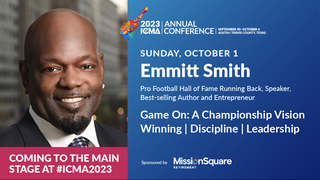A portfolio of upcoming professional development programs as well as programs local governments can bring to their jurisdictions.


NFIP is a critical resource for local government leaders, providing essential tools, financial support, and incentives that enable them to better prepare their communities.
Report on ethics violations and program highlights for fiscal year 2023.

Methods for local government leaders to better connect with staff and residents.

Jerry Giaimis transfers experience as a town administrator to ICMA's RD role to advocate for the profession and the membership.
Presentation at the 109th Annual Conference | September 30-October 4 | Austin/Travis County, Texas, USA
"You have to go through the process. The process is not easy or a straight road. It’s windy and uphill. But you’ll get to the top and look back and appreciate the journey.”

Game On: A Championship Vision: Winning, Discipline, and Leadership
